International Women's Day: Being a woman and a soldier
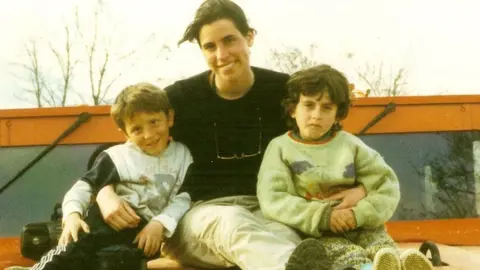 Gemma Morgan
Gemma Morgan"You didn't want to be the girl in the Army that looks weak, because they already think that you are weak."
Gemma Morgan says during her six years in the Army from 1996, toxic masculinity permeated into her life, leaving her "too assertive, too competitive, and too masculine for civilian life".
Flashbacks from Kosovo and a difficult transition to civilian life culminated in a mental health crisis.
To mark International Women's Day, Ms Morgan, now a speaker, leadership coach and mental health campaigner living in Monmouthshire, shares what she learnt from stepping "over the patriarchal line".
The Ministry of Defence (MoD) said "great strides" had been made but it was grateful to current and former servicewomen "whose testimony makes clear that on too many occasions Defence failed to provide adequate support".
- Some readers may find details in this story distressing
'An immediate outlier'
"My choice to join the Army in 1996 was unconventional.
"I was stepping outside of traditional gender boundaries.
"Through school, I was taught that girls could have it all, but the hard truth was by becoming a female soldier I became an immediate outlier.
'I became more masculine'
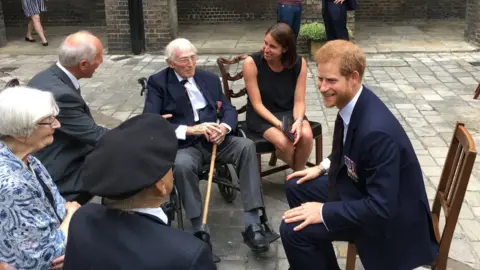 Gemma Morgan
Gemma Morgan"At the Royal Military Academy Sandhurst, we were one of the first intakes to do the same training as the men.
"Female platoons were kept separate and only a handful of roles were open to women, but it felt exciting to step over the patriarchal line.
"I became accustomed to a hyper-masculine environment and assumed the behaviours to fit in.
"No-one actually says it or writes it down but I understood that I would need to perform to a much higher standard to succeed.
"Inevitably, I became more masculine - no make-up, no heels, anything to blend in.
"My tone turned more assertive and direct, my presence more commanding.
"I began cursing profanities mid-sentence with my peers.
"You didn't want to be the girl in the Army that looks weak, because they already thought that you were weak.
"I learned to hide any sense of vulnerability, to hold this veneer of defiant perfection at all times.
"No-one told me about the dangers of the double-bind - being masculine enough to prove yourself but not so much that you are a threat. Or being too feminine and considered weak.
"The Army taught me that I was capable of achieving so much more than I ever imagined.
'Less palatable side'
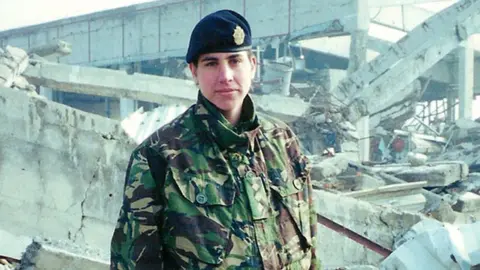 Gemma Morgan
Gemma Morgan"I miss being a sister in the brotherhood, the connection, the teamwork and knowing that someone has your back.
"I miss the adrenaline, the discipline and the focus in life.
"But I do not miss wearing men's combat boots in a smaller size because they don't make kit for women.
"I do not miss wearing a uniform that cut across my boobs and thighs. I do not miss the less palatable side.
As a troop commander, I was sexually assaulted - it was Christmas drinks with officers going to the sergeants' mess.
"As I was leaving a senior soldier approached and forced me into a small closet where the public phone was found.
"I remember the stench of his breath, his hands lunging at my body.
"I didn't complain - I didn't know who to turn to or what to say.
"Uninvited groping was commonplace at the bar or under the table at formal dinner nights.
"Groups of men would run scorecards with names of nightly conquests listed down the side.
"One officer's party trick was to 'weigh' your breasts, leaning in to mumble his cheeks against your cleavage for good measure. It was accepted as a jovial part of army life.
"From day one, we learned that such behaviour was part of the deal.
'Frigid' and 'uptight'
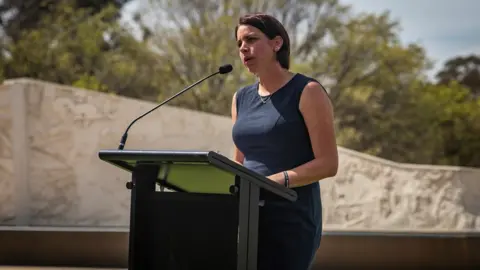 Gemma Morgan
Gemma Morgan"In training, a male officer would let himself into our rooms and we would wake to find him standing over our beds in the middle of the night.
"There was a complaint but no meaningful action was taken.
"At the regiment, soldiers mounted their walls with hard-core pornography before a room inspection - when I asked for it to be removed I was laughed at, branded 'frigid' and 'uptight'.
"It was persistent and seemingly endless but I learned to let it all wash over me - it was simply a fact of life.
"In many respects, I was lucky - my physical strength meant that I could hold my own amongst the men and comfortably meet the fitness standards required.
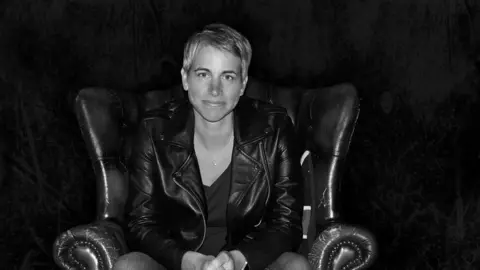 Beth Morgan
Beth Morgan'Not the right person'
"In 1999, I was ranked the best young officer in the corps and awarded the Carmen Sword by the Princess Royal.
"I remember arriving at my new posting and when the colonel welcomed me I could no longer have the role that had been assigned.
"He had been decided that they did not want a woman being the face of the Corps.
"To use his words precisely - I was the best person for the job but not the right person.
"It felt almost impossible to be a good Army Officer and a woman at the same time.
'Flashbacks'
"In 2001, I captained my country at lacrosse and to the outside world I seemed fine.
"But I was running on fumes, profoundly empty and raging inside.
"Flashbacks would haunt me - meat hanging of shattered limbs, eyes without a soul, without light. Behind closed doors vodka, Valium and sleeping pills numbed the pain but the nightmares continued, aggressive and persistent.
"When the suggestion of mental illness came, it terrified me - it meant more weakness, something that any self-respecting soldier would despise.
"The gossip around the regiment shattered my credibility overnight. There was no confidentiality, nowhere to hide. I felt cast out by the brotherhood, betrayed by the family that I had worked so hard to be accepted by.
'Cut off'
"I left the Army of my own accord - angry, running away, perhaps hoping that the nightmares would stop.
"Overnight I became a spectator, cut off from the military family and struggling to function as a new mother, a civilian and a wife.
"The transition was jolting, one minute you were in and then you were gone.
"I slept with a weapon next to my bed because it made me more comfortable.
"My game face was set permanently, constantly checking behind me, scanning the windows and corners.
"I walked with a look designed to make someone think twice.
"Life as a new mum wasn't what I had imagined.
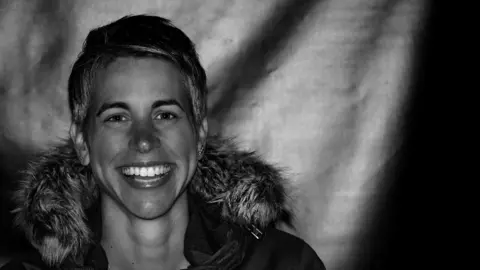 Beth Morgan
Beth Morgan'Invisible'
"I had moved away from this highly disciplined environment into motherhood, with a new born baby that would not stop crying.
"I looked for a community in veteran spaces, only to find rooms of men drinking pints and telling war stories.
"On Remembrance Days I felt invisible, assumed to be there in support of my husband's former life.
"I joined mums' coffee mornings but it felt awkward - the acceptable language, the dress code, the civilian humour.
"I was the product of a masculine culture that did not tolerate femininity.
"Outside of the wire, my behaviours violated given stereotypes.
"Everything the Army had taught me was now deemed too assertive, too competitive, and too masculine for civilian life.
'Pressure cooker'
"A woman was somehow expected to show a more refined, a more subtle and softer side.
"Add the additional layer of mental illness and you have a pressure cooker of stigma that was holding on too tight.
"At the age of 33, I tried to take my life.
"I was found by the roadside, delirious and choking on my own vomit.
"My imagination led me to barns with burnt corpses hanging off beams.
"I saw ditches with bodies lying face down.
"At around 2am each morning the same dead boy would stare at me through glazed brown eyes. It was exhausting.
"My body became ill as well as my mind.
'Toxic masculinity'
"Today, I am immensely proud of my military service and of serving alongside some remarkable women and men.
"But I regret the way that I allowed such toxic masculinity permeate into my life.
"My eyes are now open to the unspoken behaviour that others and myself normalised.
"I now value the womanhood that is essential to my being and I have developed the courage to show who I am with vulnerability, power and strength all at the same time.
"And in being true to myself I am at last feeling better and sometimes I feel amazing."
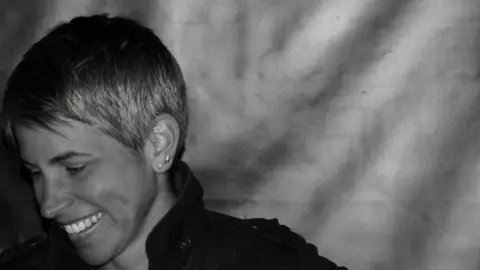 Beth Morgan
Beth Morgan'Duty to speak out'
"In school we are still teaching that women can have the same opportunities as men.
"The message is still about 'empowerment', that girls can have it all. And yet, we continue to ignore a more meaningful conversation about what navigating the male leadership space can really look like.
"My eldest daughter has just started her journey into adult life. It is for her and for other young women beside her, that I will no longer minimise parts of who I am.
"We have a duty to speak out, to challenge the status quo, no matter what the 'old boys club' may think.
No room for discrimination
A MoD spokeswoman said: "We are grateful to current and former servicewomen whose testimony makes clear that on too many occasions Defence failed to provide adequate support.
"Great strides have been made in this area, the majority of women have long and fulfilling careers in the military, but much more needs to be done. We are committed to improving the experience for women in the Armed Forces in every area of their lives.
"Anyone who falls short of our high standards of behaviour will be dealt with robustly, including dismissal and possible police investigation. There is no room for any form of discrimination in the military."
She said the MoD had recently launched an around-the-clock helpline for personnel to report and seek advice on bullying and it was working to "gain a greater understanding of the experiences that menstruating personnel have and identify areas where we can improve".
- Abridged from an article by Gemma Morgan
